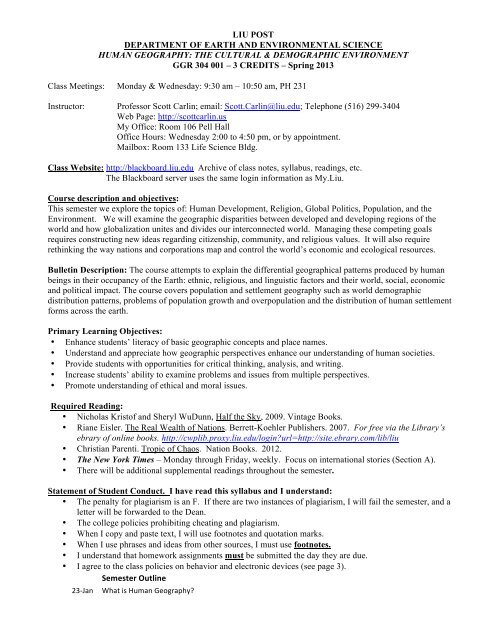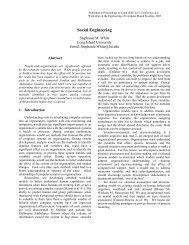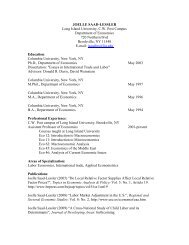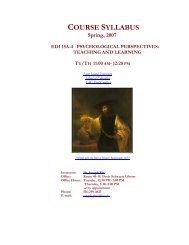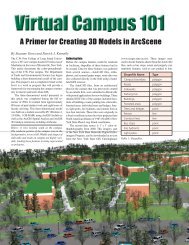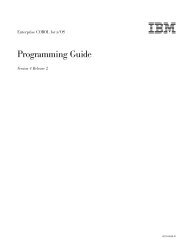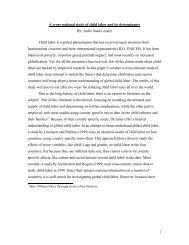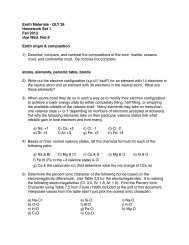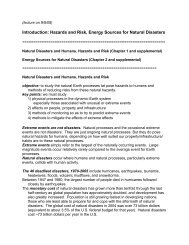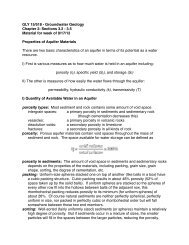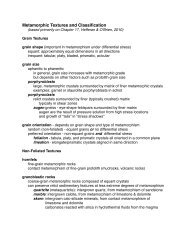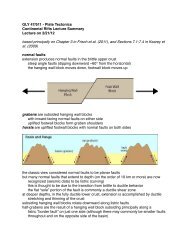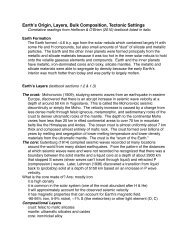GGR 304 - Human Geography - Myweb @ CW Post
GGR 304 - Human Geography - Myweb @ CW Post
GGR 304 - Human Geography - Myweb @ CW Post
Create successful ePaper yourself
Turn your PDF publications into a flip-book with our unique Google optimized e-Paper software.
LIU POSTDEPARTMENT OF EARTH AND ENVIRONMENTAL SCIENCEHUMAN GEOGRAPHY: THE CULTURAL & DEMOGRAPHIC ENVIRONMENT<strong>GGR</strong> <strong>304</strong> 001 – 3 CREDITS – Spring 2013Class Meetings: Monday & Wednesday: 9:30 am – 10:50 am, PH 231Instructor: Professor Scott Carlin; email: Scott.Carlin@liu.edu; Telephone (516) 299-3404Web Page: http://scottcarlin.usMy Office: Room 106 Pell HallOffice Hours: Wednesday 2:00 to 4:50 pm, or by appointment.Mailbox: Room 133 Life Science Bldg.Class Website: http://blackboard.liu.edu Archive of class notes, syllabus, readings, etc.The Blackboard server uses the same login information as My.Liu.Course description and objectives:This semester we explore the topics of: <strong>Human</strong> Development, Religion, Global Politics, Population, and theEnvironment. We will examine the geographic disparities between developed and developing regions of theworld and how globalization unites and divides our interconnected world. Managing these competing goalsrequires constructing new ideas regarding citizenship, community, and religious values. It will also requirerethinking the way nations and corporations map and control the world’s economic and ecological resources.Bulletin Description: The course attempts to explain the differential geographical patterns produced by humanbeings in their occupancy of the Earth: ethnic, religious, and linguistic factors and their world, social, economicand political impact. The course covers population and settlement geography such as world demographicdistribution patterns, problems of population growth and overpopulation and the distribution of human settlementforms across the earth.Primary Learning Objectives:• Enhance students’ literacy of basic geographic concepts and place names.• Understand and appreciate how geographic perspectives enhance our understanding of human societies.• Provide students with opportunities for critical thinking, analysis, and writing.• Increase students’ ability to examine problems and issues from multiple perspectives.• Promote understanding of ethical and moral issues.Required Reading:• Nicholas Kristof and Sheryl WuDunn, Half the Sky, 2009. Vintage Books.• Riane Eisler. The Real Wealth of Nations. Berrett-Koehler Publishers. 2007. For free via the Library’sebrary of online books. http://cwplib.proxy.liu.edu/login?url=http://site.ebrary.com/lib/liu• Christian Parenti. Tropic of Chaos. Nation Books. 2012.• The New York Times – Monday through Friday, weekly. Focus on international stories (Section A).• There will be additional supplemental readings throughout the semester.Statement of Student Conduct. I have read this syllabus and I understand:• The penalty for plagiarism is an F. If there are two instances of plagiarism, I will fail the semester, and aletter will be forwarded to the Dean.• The college policies prohibiting cheating and plagiarism.• When I copy and paste text, I will use footnotes and quotation marks.• When I use phrases and ideas from other sources, I must use footnotes.• I understand that homework assignments must be submitted the day they are due.• I agree to the class policies on behavior and electronic devices (see page 3).Semester Outline 23-‐Jan What is <strong>Human</strong> <strong>Geography</strong>?
<strong>GGR</strong> <strong>304</strong> - Spring 2013 – Carlin 1.22.13Political <strong>Geography</strong> 28-‐Jan Modernization & <strong>Human</strong> Development Greiner (Blackboard) 30-‐Jan Jihad v. McWorld B. Barber (Blackboard) 4-‐Feb GeoPolitics Kaplan (Blackboard) 6-‐Feb Why We Fight? video 11-‐Feb 50 States, Nations, Supranationalism TBA Climate Change 13-‐Feb Climate Change: Science & Politics Parenti, Part 1 18-‐Feb No Classes 19-‐Feb Climate Change: Africa (Tue) Parenti, Part 2 20-‐Feb Climate Change: Asia Parenti, Part 3 25-‐Feb Climate Change: Long Island TBA 27-‐Feb Midterm Real Wealth of Nations 4-‐Mar Real Wealth of Nations I Riane Eisler, pp 1 -‐ 46 6-‐Mar Real Wealth of Nations II Riane Eisler, Ch. 3 & 5 11-‐Mar Spring Break 13-‐Mar Spring Break 18-‐Mar Real Wealth of Nations III Riane Eisler, Ch. 6 & 7 Earth: 7 Billion People 20-‐Mar Malthus: Right or Wrong? PRB, World at 7 Billion, 25-‐Mar Demographic Transition (Blackboard) Gender & <strong>Human</strong> Development 27-‐Mar Gender & Education Kristof, Ch. 10 1-‐Apr Gender & <strong>Human</strong> Health Kristof, Ch. 6 & 7 3-‐Apr Sexual Trafficking Kristof, Ch. 1 -‐ 3 8-‐Apr Violence & Gender Kristof, Ch. 4 & 5 10-‐Apr Religion & <strong>Human</strong> Development The <strong>Geography</strong> of Buddhism Thich Nhat Hanh, (Blackboard) 15-‐Apr Christianity & Population Ethics Kristof, Ch. 8 17-‐Apr The <strong>Geography</strong> of Islam Kristof, Ch. 9 22-‐Apr The Universe Story: Rethinking Earth's Story Swimme, (Blackboard) 24-‐Apr Creating a Sustainable Long Island Parenti, Ch. 16 29-‐Apr Final Exam Review 2
<strong>GGR</strong> <strong>304</strong> - Spring 2013 – Carlin 1.22.13POLICIES ON GRADING, ATTENDANCE, ASSIGNMENTS, AND EXAMSGrading: Evaluation of student performance is based on the following course components:Homework50 pointsFinal Exam25 pointsMidterm15 pointsQuizzes10 pointsTotal possible points100 pointsFinal grades for the course are determined according to the following scale:A = 4.00 = 93.0-100 B+ = 3.33 = 87.0-89.9 C+ = 2.33 = 77.0-79.9 D = 60-69.9 pts F = 0.0 = < 60.0A- = 3.67 = 90.0-92.9 B = 3.00 = 83.0-86.9 C = 2.00 = 73.0-76.9B- = 2.67 = 80.0-82.9 C- = 1.67 = 70.0-72.9Attendance & Readings: The Undergraduate Bulletin states: “It is expected that students will attend all classsessions scheduled for the courses in which they are enrolled.”Quizzes: Short quizzes during the semester will gauge your understanding of homework and class topics.Assignments: Assignments must be submitted on time. Assignments are typically short essays that focus oncommunication, reading comprehension, and critical thinking skills. Short class presentations may be required.Exams: Exam dates are listed on this syllabus. Exams can include multiple choice, short answer, essay, andmapping questions. You will be tested on your knowledge of material covered in class lectures, discussions,assigned readings, and other homework assignments. Notify me of any conflicts with sport or club schedulingconflicts early in the semester.Make-up exams: Make-up examinations will be allowed only under extenuating circumstances such as adocumented illness or personal emergency. You must notify me of this situation as soon as possible, generallywithin 24 hours of the scheduled exam. It is not acceptable to say, “I was sick last week can I make up the examnext week?” You will need a written note from a health care provider documenting your illness. It is unusual, butif exam dates change during the semester it is your responsibility to stay informed about these changes.Class Behavior: Please come to class prepared. You are expected to participate in class discussions. It isgenerally not appropriate to leave class for a bathroom break, to take phone calls, etc. Please take care of yourpersonal needs before entering class. If you need to eat a snack food in class, please do so quietly.Electronic Devices: Please turn off your cell phone/pager and other hand-held devices while in class. You arepermitted to use laptop computers in class to take notes and to access the electronic edition of the textbook. Aclanking keyboard can be distracting, please be mindful of how your typing affects others. Do not use your laptopcomputer for other purposes (e.g., email, Facebook, web surfing, etc.).Plagiarism will be dealt with severely. All work presented on exams and written assignments must be your own.Any written passages not in your own words must be in quotation marks with the source noted. Reference allfactual information and other people’s ideas in your written assignments.Extra credit: I do not make available extra credit assignments. If your first exam grade is much lower than youexpected, then spend more time each week preparing for class and reviewing your notes to bring your average up.This effort includes seeking additional help from me during office hours or other mutually convenient times.Work Effort: Students are expected to devote the following amounts of time to this course: In class lectureperiods (3 hours/week or 45 hours); Readings (45 hours); Reviewing class notes (2 hours/week or 30 hours);Exam/quiz preparation (15 hours); Writing assignments (15 to 25 hours).3


